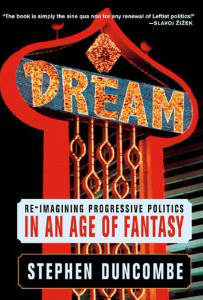Reality needs fantasy to render it desirable, just as fantasy needs reality to make it believable.
 Great movies and novels tap into our dreams and help bring our deepest desires to the surface. Even not so great movies accomplish this task. They provide a break from reality and an entry into imagined worlds, often giving life to our most absurd and explicit fantasies. So why should Dr. Pop celebrate these avenues of escape? Is not delusion an enemy of transformation? Isn’t Dr. Pop all about helping people to face reality? And to actually do something to make it better?
Great movies and novels tap into our dreams and help bring our deepest desires to the surface. Even not so great movies accomplish this task. They provide a break from reality and an entry into imagined worlds, often giving life to our most absurd and explicit fantasies. So why should Dr. Pop celebrate these avenues of escape? Is not delusion an enemy of transformation? Isn’t Dr. Pop all about helping people to face reality? And to actually do something to make it better?
The short answer is: Yes and No. We at Dr. Pop are 1000% committed to positive social transformation. There is no question about that. Yet we believe that in order to be 1000% committed to anything requires radically embracing our fantasies, our dreams, and our deepest desires. In fact, we believe that ethical illusions can be used to draw people closer to their actually existing surroundings. This means embracing storytelling and seeing fiction as more than just a form of weekend entertainment. It means creating and discovering ways to bring the world of fantasy into our political lives.
This is precisely what Stephen Ducombe calls for in his book Dream: Re-imagining Progressive Politics in an Age of Fantasy. In the book, my latest favorite work, Ducombe challenges progressives to embrace spectacle as a way to manifest our ethics of fairness, justice, and equity. The ballot box, conventional protest, and enlightening panel will never be enough to transform our world, precisely because these political methods largely fail to tap into our dreams the ways that movies and novels so easily do. Instead, Ducombe argues, our politics must take on bolder and more fantastic forms. Our streets must be reclaimed, our stores must be occupied with song, and our imaginations must be channeled in ways that well-reasoned arguments will never achieve alone.
Among his key points, Ducombe claims that truth and power belong to those who tell the better story. To make his point he frequently points to the Bush administration which was able to maintain incredible power for eight years despite its obvious lies and deceptions. Yet what the Bush administration clearly understood is the need to entertain and to create spectacles that can be exploited for political ends. If these methods are bound to be used, the question then becomes – toward what ends?
Make no mistake, Ducombe is aware of the dangers of such fantastic methods and he cites Nazi Germany as a clear example of how political spectacles can facilitate real-life horror stories. Yet just because stories and spectacles have been used a vehicles for hateful destruction in the past is no reason to abandon such methods outright. Like Dr. Pop, Ducombe asserts that imaginative political acts can actually be filled with enlightened ethics and expressed in ways that expand democratic participation rather than augment dictatorship. For beautiful examples of these possibilities, look no further than Antonus Mockus, the former superhero mayor of Bogotá and unofficial muse of Dr. Pop.
What Mockus understands – and what all successful progressives must come to grasp – is that politics cannot be separated from human motivation, from the actions and events which speak to our inescapable irrationality and satisfy our emotional needs. And so we must learn how to mobilize human motivations in ways that increase transparency, expand social consciousness, and deepen participation. Only then can we expect to build a social movement whose events are deemed a better use of people’s time than NetFlix, Twilight, and Gossip Girl. Indeed, only then can we help people to find the courage to face reality by diving into the romance, honor, sacrifice and mystery of social change efforts.
In summary- Accomplishing goals as lofty as justice for all, means being comfortable with lofty methods. It means organizers becoming unafraid to don superhero capes, politicians daring to share fantastical visions, and everyday activists creating new, risky ways to shine light on the worlds around them. If you know of great examples of such courageous dreams in action, please share them through your comments below.
